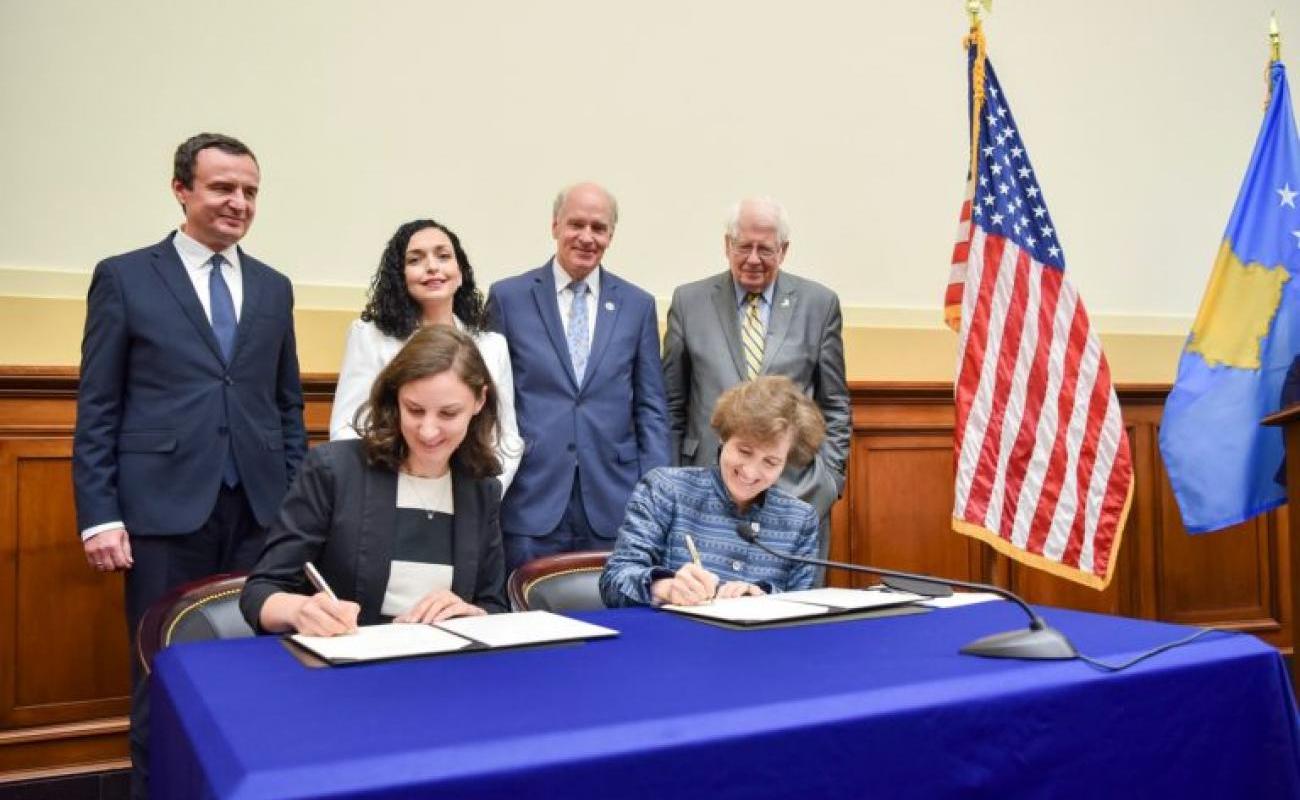U.S., Kosovo Celebrate $202M Energy Grant on Capitol Hill

WASHINGTON (July 27, 2022) — The U.S. government’s Millennium Challenge Corporation (MCC) and the Government of the Republic of Kosovo celebrated the signing of the $202 million Kosovo Compact today during a ceremony hosted by the Chairman of the House Foreign Affairs Subcommittee on Europe, Energy, the Environment, and Cyber, Congressman William Keating, at the U.S. House of Representatives’ Rayburn House Office Building.
“This signing represents the continuation of a deep partnership between the United States and Kosovo, and our commitment to working together to build modern, clean energy solutions that will benefit all of the nearly 2 million Kosovan,” said MCC Chief Executive Officer, Alice Albright. “Our planned investments in the energy sector will accelerate the country’s transition towards an energy future that is more sustainable, inclusive, reliable, and affordable.”
The ceremony was attended by leaders from across the U.S. and Kosovo governments, including the President of Kosovo Vjosa Osmani, Prime Minister Albin Kurti, and Minister of Economy Artane Rizvanolli.
“Today’s ceremony is a testament to the special relationship between the Republic of Kosovo and the United States of America and the culmination of hard work that has led to this transformational agreement for our energy sector,” said President Osmani. “The planned investments will help our country to build a stronger and more resilient sector, as well as facilitate a smoother energy transition. The Compact Agreement builds on everything we have jointly achieved thus far, but crucially it ensures that the energy transition promotes women empowerment and enables a sustainable and more inclusive future for the people of Kosovo.”
In recent years, demand for electricity in Kosovo has far exceeded supply — a problem expected to worsen in the years to come. Four out of ten households in Kosovo experience energy poverty, the highest rate among the five neighboring countries for which data exists. Unreliable electricity results in frequent supply disruptions, requiring Kosovo to rely on costly emergency energy imports and highly polluting sources such as coal-fired plants to meet its electricity needs.
“This is going to be the largest and most innovative energy investment in Kosovo to date,” said Prime Minister Kurti. “The compact program will be the cornerstone of our green transition, and it will contribute to our energy security and social-economic transformation. Today, we are not only marking a historic cooperation on shared goals in the energy sector, but we are also celebrating the deeply rooted relations and shared values between our two nations.”
The Kosovo Compact, which includes an additional $34 million contribution from the Government of Kosovo, will build on MCC’s initial $49 million Kosovo Threshold Program that targeted energy policy and institutional reforms to lay the groundwork for large-scale energy infrastructure construction, and pathways to employment for youth and women in the energy sector. The compact is comprised of three projects:
- Energy Storage. The Energy Storage Project aims to support energy security, reduce energy costs, and facilitate a transition to a cleaner energy future by investing in 350 megawatt-hours of energy storage systems, which can fill in gaps of longer-scale, unexpected outages or shifting energy to cover peak demand; by supporting technical and administrative capacity building for energy and climate regulators; and by implementing policy and institutional reforms required for a well-defined operating environment for energy storage in Kosovo while also promoting more employment and entrepreneurship opportunities for women in the country’s energy sector.
- Energy Education and Training for All. The Just and Equitable Transition Acceleration Project aims to establish new technical training programs that provide the skills demanded by employers in the energy and adjacent sectors; and to incentivize practices that facilitate gender equity practices among energy sector employers, providing technical assistance to help increase female representation in Kosovo’s energy companies and supporting networking, training, and mentoring opportunities for women.
- Private Sector Sustainability. The American Catalyst Facility for Development Project aims to promote additional private-sector investments in Kosovo’s energy sector in collaboration with the U.S. International Development Finance Corporation by complementing MCC’s funding and leveraging private sector participation to scale a successful energy storage public entity launch and catalyzing complementary renewable energy investments that bolster renewable energy generation capacity.
“Kosovo is a strong partner of the United States and has always welcomed U.S. involvement in the country and the Balkans at large,” said Congressman Keating. “I applaud the Biden administration’s efforts to meet global challenges, including climate change, which is evident through the new Millennium Challenge Compact we are signing today. This new Compact with Kosovo will expand energy security by increasing the energy storage necessary for a green and just transition, train a host of forward-thinking young leaders with a focus on gender equity in the energy sector, and facilitate more significant foreign investment in Kosovo’s energy market. In a time of immense economic and geopolitical pressure due to Russia’s illegal invasion of Ukraine, this Compact represents Kosovo’s Euro-Atlantic future and the strong relationship between Kosovo and the United States.”
The Millennium Challenge Corporation is an independent U.S. government agency working to reduce global poverty through economic growth. Created in 2004, MCC provides time-limited grants and assistance to countries that meet rigorous standards for good governance, fighting corruption and respecting democratic rights.
